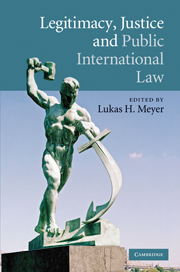Book contents
- Frontmatter
- Contents
- List of contributors
- Acknowledgements
- Introduction: Legitimacy, justice and public international law. Three perspectives on the debate
- 1 The legitimacy of global governance institutions
- 2 Institutionalising global demoi-cracy
- 3 The responsibilities and legitimacy of economic international institutions
- 4 Do international organisations play favourites? An impartialist account
- 5 ‘Victors’ justice'? Historic injustice and the legitimacy of international law
- 6 International law and global justice
- 7 Global justice: Problems of a cosmopolitan account
- 8 The responsibility to protect human rights
- 9 The threat of violence and of new military force as a challenge to international public law
- 10 Forcing a people to be free
- Index
- References
6 - International law and global justice
Published online by Cambridge University Press: 03 May 2010
- Frontmatter
- Contents
- List of contributors
- Acknowledgements
- Introduction: Legitimacy, justice and public international law. Three perspectives on the debate
- 1 The legitimacy of global governance institutions
- 2 Institutionalising global demoi-cracy
- 3 The responsibilities and legitimacy of economic international institutions
- 4 Do international organisations play favourites? An impartialist account
- 5 ‘Victors’ justice'? Historic injustice and the legitimacy of international law
- 6 International law and global justice
- 7 Global justice: Problems of a cosmopolitan account
- 8 The responsibility to protect human rights
- 9 The threat of violence and of new military force as a challenge to international public law
- 10 Forcing a people to be free
- Index
- References
Summary
Introduction
It is generally known that people in numerous regions of the world, which usually are called ‘Third World’ or ‘developing countries’, particularly Africa, South America, Asia and South East Europe, suffer from extreme poverty. Although a group of developing countries have achieved enormous growth by which they could overcome their backwardness, social and economic inequalities in the world have increased significantly in the course of the last century. It seems obvious that the causes for the misery of poor countries lie in their legal and political structures themselves, at least to a considerable extent. In almost all of them, wealth is distributed extremely unequally, public education is miserable, economic productivity is very low, women are kept under suppression, and birth rates are high. In many countries, large parts of the population suffer from exploitation, because they are denied equal protection of their rights by a corrupt state bureaucracy and judiciary. And many of those countries are under the control of oppressive regimes that rule with brute force, persecute any opposition and misuse their power to their own benefit. When a number of these factors come together, they easily lead to a ‘vicious circle of poverty’, a self-enforcing process of social impoverishment that a nation hardly can overcome by itself.
It appears plausible to assume that the prevailing features of global poverty and misery are closely connected with the existing legal structures in general and the legal positions of the disadvantaged people in particular. And various empirical studies confirm that.
- Type
- Chapter
- Information
- Legitimacy, Justice and Public International Law , pp. 186 - 206Publisher: Cambridge University PressPrint publication year: 2009
References
- 2
- Cited by

